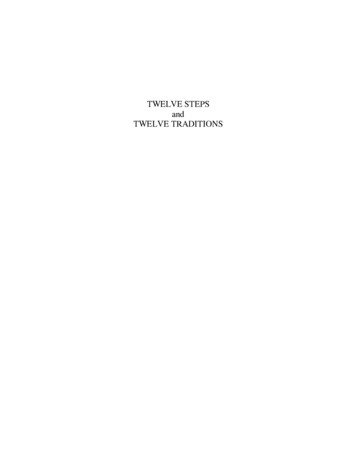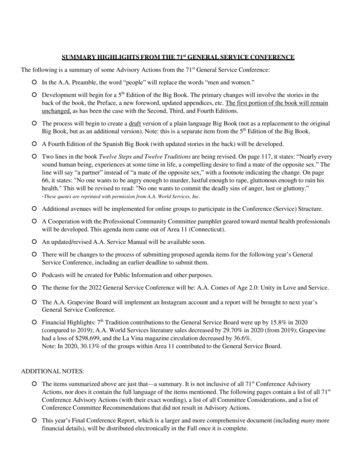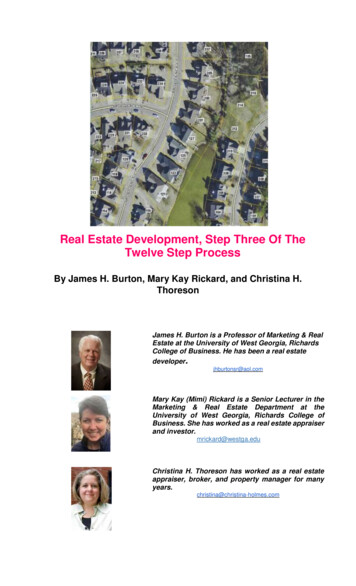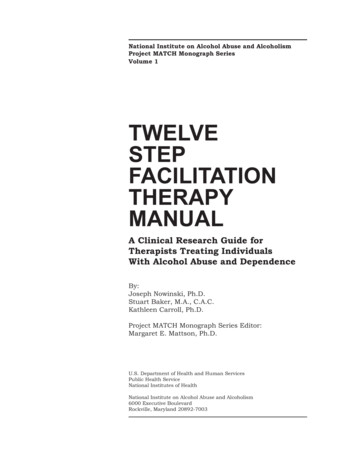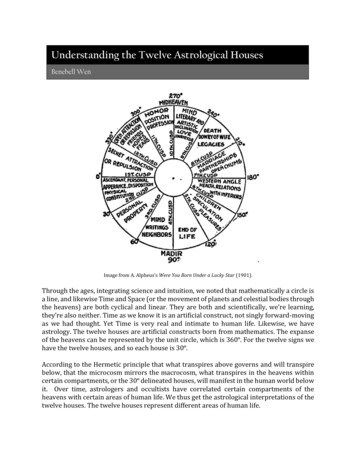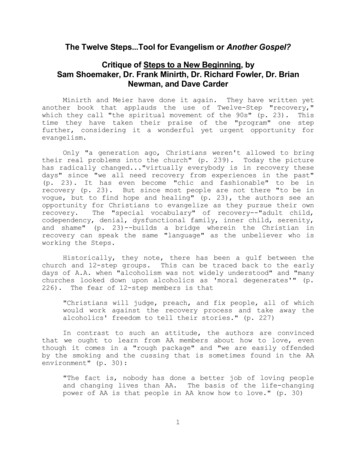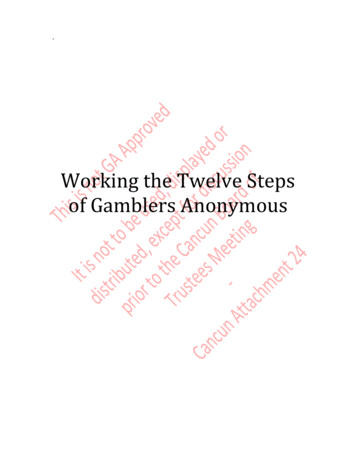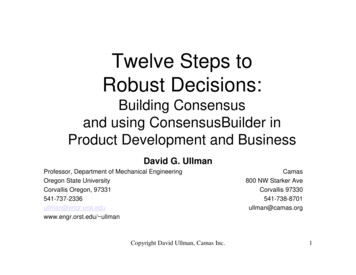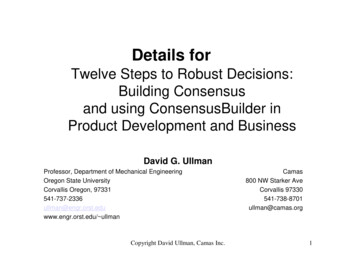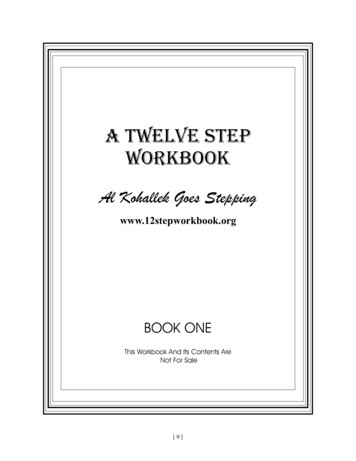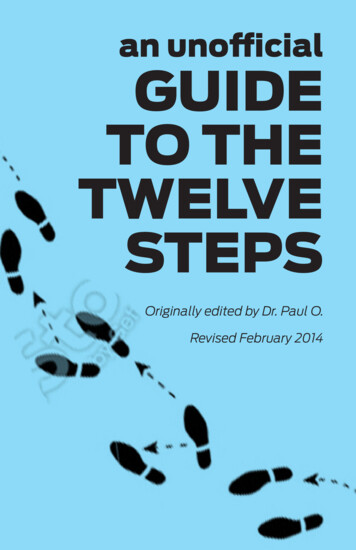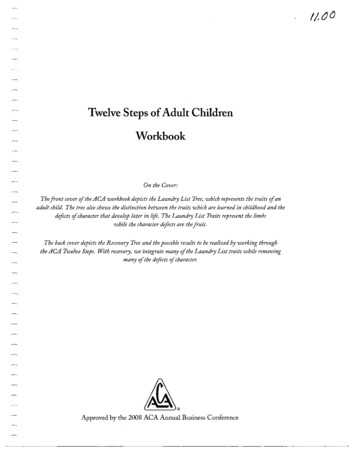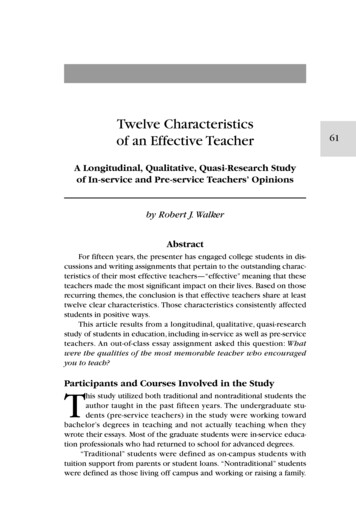
Transcription
Twelve Characteristicsof an Effective TeacherA Longitudinal, Qualitative, Quasi-Research Studyof In-service and Pre-service Teachers’ Opinionsby Robert J. WalkerAbstractFor fifteen years, the presenter has engaged college students in discussions and writing assignments that pertain to the outstanding characteristics of their most effective teachers—“effective” meaning that theseteachers made the most significant impact on their lives. Based on thoserecurring themes, the conclusion is that effective teachers share at leasttwelve clear characteristics. Those characteristics consistently affectedstudents in positive ways.This article results from a longitudinal, qualitative, quasi-researchstudy of students in education, including in-service as well as pre-serviceteachers. An out-of-class essay assignment asked this question: Whatwere the qualities of the most memorable teacher who encouragedyou to teach?Participants and Courses Involved in the StudyThis study utilized both traditional and nontraditional students theauthor taught in the past fifteen years. The undergraduate students (pre-service teachers) in the study were working towardbachelor’s degrees in teaching and not actually teaching when theywrote their essays. Most of the graduate students were in-service education professionals who had returned to school for advanced degrees.“Traditional” students were defined as on-campus students withtuition support from parents or student loans. “Nontraditional” studentswere defined as those living off campus and working or raising a family.61
educational HORIZONS62Fall 2008The students were enrolled in various courses, some held during theday, others at night. The courses included Methods of Teaching Science;Methods of Teaching Math; Methods of Teaching Social Studies;Curriculum Development; Child Development; Introduction to SpecialEducation; Problems in the Elementary School; Educational Technology;and Teaching in the Urban Setting.More than one thousand students matriculated through these undergraduate and graduate classes, held in the United States, Canada,Bermuda, and the Caribbean. Several students from Africa participated.The courses were taught at both predominately white and historicallyblack institutions, including two private colleges; three public universities; a junior college; and a technical college. The multiplicity of institutions and courses over the years provided the study with a diversestudent population: young and old, black and white, Hispanic, those ofAsian nationality, males, and females. The students were mainly earlychildhood majors, training to teach nursery to grade three (N–3); elementary education majors, training to teach kindergarten to sixth grade(K–6); and secondary education majors, training to teach seventh totwelfth grades (7–12) in specific subject areas such as physical education, mathematics, science, history, and music. The elementary education majors formed the largest contingent.
Twelve Characteristics of an Effective TeacherBesides the undergraduate and graduate students, there were alsostudents working on alternative master’s degrees. Those students hadobtained bachelor’s degrees in other fields such as social work, psychology, mathematics, and biology and later decided that they wanted toteach. Some alternative master’s degree students were changing careersafter working in other professions. Many had already begun teachingusing emergency teaching certificates.Definition of TermsEffective described a particular teacher who had been the most successful in helping respondents to learn.Characteristics described a particular teacher’s special personal qualities that the respondents felt had enabled the teachers to achieve success.Research InstrumentDuring the first week of each course taught at the various institutions (listed above in “Participants and Courses Involved in the Study”), Iassigned students an essay on their most memorable teachers: those whohad the greatest impact on their lives and who were most successful(effective) in teaching the subject matter; the teachers they most wantedto emulate and who might have had the greatest impact on their decisionto enter teaching. I asked the students to explain their selection of particular teachers by providing examples of how those teachers inspired themand by describing special personal qualities or characteristics.Data AnalysisOver the years, students described their favorite and most memorable teachers with statements such as “She was always prepared.”“He was very positive.”“She had high expectations for me!”“She was the most creative teacher I have ever had!”“He was so fair!”“I liked her personal touch!”“I felt that I was a part of the class.”“She showed me compassion when my mother died.”“He was so funny!” . . . “She taught her class in a fun way.”“I was never bored in his class.”“He gave all the students respect and never embarrassed me in frontof the class.”“She did not hold what I did against me!”63
educational HORIZONS 64Fall 2008“He was the first teacher I had who admitted that he had made amistake.”“She apologized to me.”Semester after semester, year after year, a common theme emergedin the essays and class discussions of what makes a good teacher: students emphasized the personal (qualitative) traits of memorable teachers rather than academic (quantitative) qualifications. Students seldommentioned where teachers attended school, what degrees they held, orwhether they had been named a “Teacher of the Year.” Instead, studentsfocused on these teachers’ nurturing and caring qualities.For fifteen years, I listened closely to class discussions about memorable teachers and read compositions on the topic, and in later years Iretained copies of their essays as qualitative data. The student essayspointed to several personality traits prevalent among their favorite andmost memorable teachers. Such teachers came to class preparedmaintained positive attitudes about teaching and about studentsheld high expectations for all studentsshowed creativity in teaching the classtreated and graded students fairlydisplayed a personal, approachable touch with studentscultivated a sense of belonging in the classroomdealt with student problems compassionatelyhad a sense of humor and did not take everything seriouslyrespected students and did not deliberately embarrass themwere forgiving and did not hold grudgesadmitted mistakesFindingsThe essays, combined with pre- and post-class discussions of theassignment, led me to formulate twelve identifiable personal and professional characteristics of effective teachers:Characteristic 1: PreparedThe most effective teachers come to class each day ready to teach.1. It is easy to learn in their classes because they are ready for the day.2. They don’t waste instructional time. They start class on time. Theyteach for the entire class period.3. Time flies in their classes because students are engaged in learning—i.e., not bored, less likely to fall asleep.
Twelve Characteristics of an Effective TeacherCharacteristic 2: PositiveThe most effective teachers have optimistic attitudes about teachingand about students. They1. See the glass as half full (look on the positive side of every situation)2. Make themselves available to students3. Communicate with students about their progress4. Give praise and recognition5. Have strategies to help students act positively toward one anotherCharacteristic 3: Hold High ExpectationsThe most effective teachers set no limits on students and believeeveryone can be successful. They1. Hold the highest standards2. Consistently challenge their students to do their best3. Build students’ confidence and teach them to believe in themselvesCharacteristic 4: CreativeThe most effective teachers are resourceful and inventive in howthey teach their classes. They1. Kiss a pig if the class reaches its academic goals2. Wear a clown suit3. Agree to participate in the school talent show4. Use technology effectively in the classroomCharacteristic 5: FairThe most effective teachers handle students and grading fairly. They1. Allow all students equal opportunities and privileges2. Provide clear requirements for the class3. Recognize that “fair” doesn’t necessarily mean treating everyonethe same but means giving every student an opportunity to succeed4. Understand that not all students learn in the same way and at thesame rateCharacteristic 6: Display a Personal TouchThe most effective teachers are approachable. They1. Connect with students personally2. Share personal experiences with their classes3. Take personal interest in students and find out as much as possibleabout them4. Visit the students’ world (sit with them in the cafeteria; attendsporting events, plays, and other events outside normal schoolhours)65
educational HORIZONSFall 2008Characteristic 7: Cultivate a Sense of BelongingThe most effective teachers have a way of making students feel welcome and comfortable in their classrooms.1. Students repeatedly mentioned that they felt as though theybelonged in classrooms taught by effective teachers.2. The students knew they had a good teacher who loved teachingand preferred it to other occupations.66Characteristic 8: CompassionateThe most effective teachers are concerned about students’ personalproblems and can relate to them and their problems. Numerous storiesestablished how the sensitivity and compassion of caring teachersaffected them in profound and lasting ways.Characteristic 9: Have a Sense of HumorThe most effective teachers do not take everything seriously andmake learning fun. They1. Use humor to break the ice in difficult situations2. Bring humor into the everyday classroom3. Laugh with the class (but not at the expense of any particularstudent)Characteristic 10: Respect StudentsThe most effective teachers do not deliberately embarrass students.Teachers who give the highest respect, get the highest respect. They1. Respect students’ privacy when returning test papers2. Speak to students in private concerning grades or conduct3. Show sensitivity to feelings and consistently avoid situations thatunnecessarily embarrass studentsCharacteristic 11: ForgivingThe most effective teachers do not hold grudges. They1. Forgive students for inappropriate behavior2. Habitually start each day with a clean slate3. Understand that a forgiving attitude is essential to reaching difficult students4. Understand that disruptive or antisocial behavior can quickly turna teacher against a student, but that refusing to give up on difficultstudents can produce successCharacteristic 12: Admit MistakesThe most effective teachers are quick to admit being wrong. They1. Apologize to mistakenly accused students
Twelve Characteristics of an Effective Teacher2.Make adjustments when students point out errors in grading ortest material that has not been assignedConclusionsThe findings of this study were drawn from essays of college students majoring in education. Students also read their essays and discussed their most memorable teachers in class, where they shared theiropinions about effective teaching. They identified twelve characteristicsof an effective teacher and in turn committed themselves to becomingeffective teachers themselves.It is my hope that educators will recognize the validity of thesetwelve characteristics of an effective teacher and will seek to adoptthem as their own.Further Reading on the Twelve Characteristics1. PreparedRenard, Lisa. “What to Do! What to Do!” ASCD’s Classroom Leadership Online, Vol.2, No. 8. 1999. 1 page.Wong, Harry K., and Rosemary T. Wong. How to Be an Effective Teacher: The First Daysof School. Mountain View, Calif.: Harry K. Wong Publications, 2001. 338 pages.2. PositiveHaynes, Judie. “Creating an Atmosphere of Acceptance,” http://www.everythingESL.net . 1998–2004. 2 pages.3. Hold High ExpectationsGazin, Ann. “What Do You Expect?” Instructor, 2004.4. CreativeBaltz, Pann. “Creativity in the Classroom: An Exploration,” 2003.Manzo, Anthony, and Ula Manzo. Teaching Children to Be Literate: A ReflectiveApproach. Instructional Elements for Fostering Higher-Order Thinking in theClassroom. Fort Worth: Harcourt Brace College Publishers, 1995.5. FairPaul, David. “Getting Down to Basics: Gaining Respect from Children in theClassroom.” Daily Yomiuri, 2002. 2 pages.Salzmann, Mary E. I Am Fair. Edina, Minn.: SandCastle, 2002.6. Display a Personal TouchSadker, Myra, and David Sadker. In “Classroom Tips for Non-Sexist, Non-RacistTeaching.” Teachers, Schools & Society. New York: McGraw-Hill, 2005.7. Cultivate a Sense of BelongingBrick, Madeline. “Increase Students’ Sense of Belonging with Responsive ClassroomPhilosophy: An Interview with Madeline.” Curriculum Review, 2002. 1 page.Smith, Denise. “Inclusion Education.” Fuerstenau Early Childhood Center, 2004.2 pages.67
educational HORIZONSFall 20088. CompassionateRaatma, Lucia. Caring. Mankato, Minn.: Capstone Press, 2000. 24 pages.9. Have a Sense of HumorGirdlefanny, Snotty. “Using Humor in the Classroom.” Techniques, 2005. 4 pages.Lipman, Larry. “Humor and Fun in Team Building and the Classroom.” Fun TeamBuilding, 2004. 2 pages.10. Respect Students68Court TV. “Respecting Young Adolescents.” A Teacher’s Guide: Working with YoungAdolescents, 2005. 2 pages.Sleigh, Merry J., and Darren R. Ritzer. “Encouraging Student Attendance.” APSObserver, Vol. 14, No. 9. 2001. 1 page.11. ForgivingSams, Tim. “The Art of Forgiveness,” http://www.mysacredjourney.com , 2004.2 pages.Wright, Rusty. “Forgiveness Can Be Good for Your Health,” http://www.probe.org/docs/forgive.html , 2000. 2 pages.12. Admit MistakesCosta, Arthur L., and Bena Kallick. “Remaining Open to Continuous Learning,” http://www.habits-of-mind.net , 2004. 12 pages.Walters, Stephanie. “What Do I Do When I Realize I’ve Made a Mistake with a Child?” acher/NTTOC.shtml ,2004. 2 pages.Robert J. Walker, Ed.D., is an assistant professor in the College ofEducation, Department of Curriculum and Instruction, at AlabamaState University.
2. The students knew they had a good teacher who loved teaching and preferred it to other occupations. Characteristic 8: Compassionate The most effective teachers are concerned about students’ personal problems and can relate to them and their problems. Numerous stories establis
